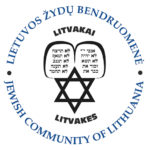You’re invited today at 4:30 P.M. to attend a ceremony at the Choral Synagogue in Vilnius where candles will be lit in memory of the victims of the Holocaust and the El malei Rakhamim prayer will be sung. Afterwards all are invited to the Lithuanian Jewish Community at Pylimo street no. 4 in Vilnius to a discussion of Jewish history with professor Antony Polonsky, moderated by professor Šarūnas Liekis, at 6:00 P.M.
Scratch an Historical Lithuanian Town, You Might Get a Shtetl
The Lithuanian Cultural Heritage Department announced they are already planning for this year’s European Day of Jewish Culture and have selected a theme, “The Diaspora and Heritage: The Shtetl.” They characterized the choice as an intentional, mature and topical one for a country where the formerly large Jewish ethnic and religious minority thrived until the 1940s in shtetls.
They explained the word “shtetl” means small town in Yiddish. “When the Jerusalem Temple was destroyed in 70 C.E., Jews spread throughout the world, starting a new stage in the existence of the people, life in the Diaspora. Jews who settled in the Grand Duchy of Lithuania from the latter half of the 14th century and their descendants are called Litvaks. They are a branch of the Ashkenazi, Jews fleeing persecution in the German lands in the Middle Ages,” the department noted in a press release.
They continue: “It’s possible the origins of the shtetls reach back to the 18th century, but one shouldn’t get the mistaken impression that every historical Lithuanian Grand Duchy or Lithuanian town may be called a shtetl. Not so! Only a town where Litvaks comprised up to half, and often more, of the population and where the spirit of Litvak enterprise and intellectual ferment was felt can be called a shtetl without reservations.”
Vilna Gaon Museum Offers Free Tours, 2 Films and Discussion for Holocaust Day
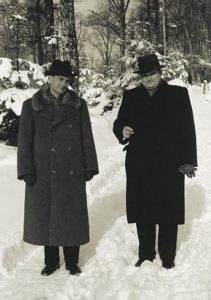
To mark International Holocaust Remembrance Day, the Vilna Gaon State Jewish Museum in Vilnius is screening two biographical films and opening a new exhibit about a remarkable friendship between a Pole and Hungarian which ended up saving thousands of lives. The events are open to the public at the museum’s Tolerance Center located at Naugarduko street no. 10/2, Vilnius.
On January 26 the museum debuts its exhibition called Sławik and Antall: The Great Rescuers. Heroes of Three Nations: Poles, Hungarians and Jews and screens the film Life on the Edge. Henryk Sławik, József Antall’s Senior (2014) with the film’s director Grzegorz Łubczyk participating. The film is being shown in cooperation with the embassies of Poland and Hungary and the Polish Institute in Vilnius.
The museum will offer a different take on the Holocaust on January 31, with the discussion at the Tolerance Center at 5:30 P.M. called “The Banality of Evil” with museum director and writer Markas Zingeris and historian Nerijus Šepetys. The discussion is to be followed by a screening of the biographical film Hannah Arendt, to be shown in cooperation with the German embassy to Lithuania. The film is about Arendt who wrote about the Eichmann trial in Jerusalem for the New Yorker magazine and in her own book. Arendt’s ideas about what she called the banality of the evil at work among up-and-coming young Nazi professionals has been met with both criticism and acclaim since she wrote her groundbreaking work.
On January 27, the 72nd anniversary of the liberation of Auschwitz-Birkenau, the Holocaust Exhibit of the Vilna Gaon Jewish State Museum at Pamėnkalnio street no. 12, Vilnius, will offer to the public free guided tours in English or Lithuanian.
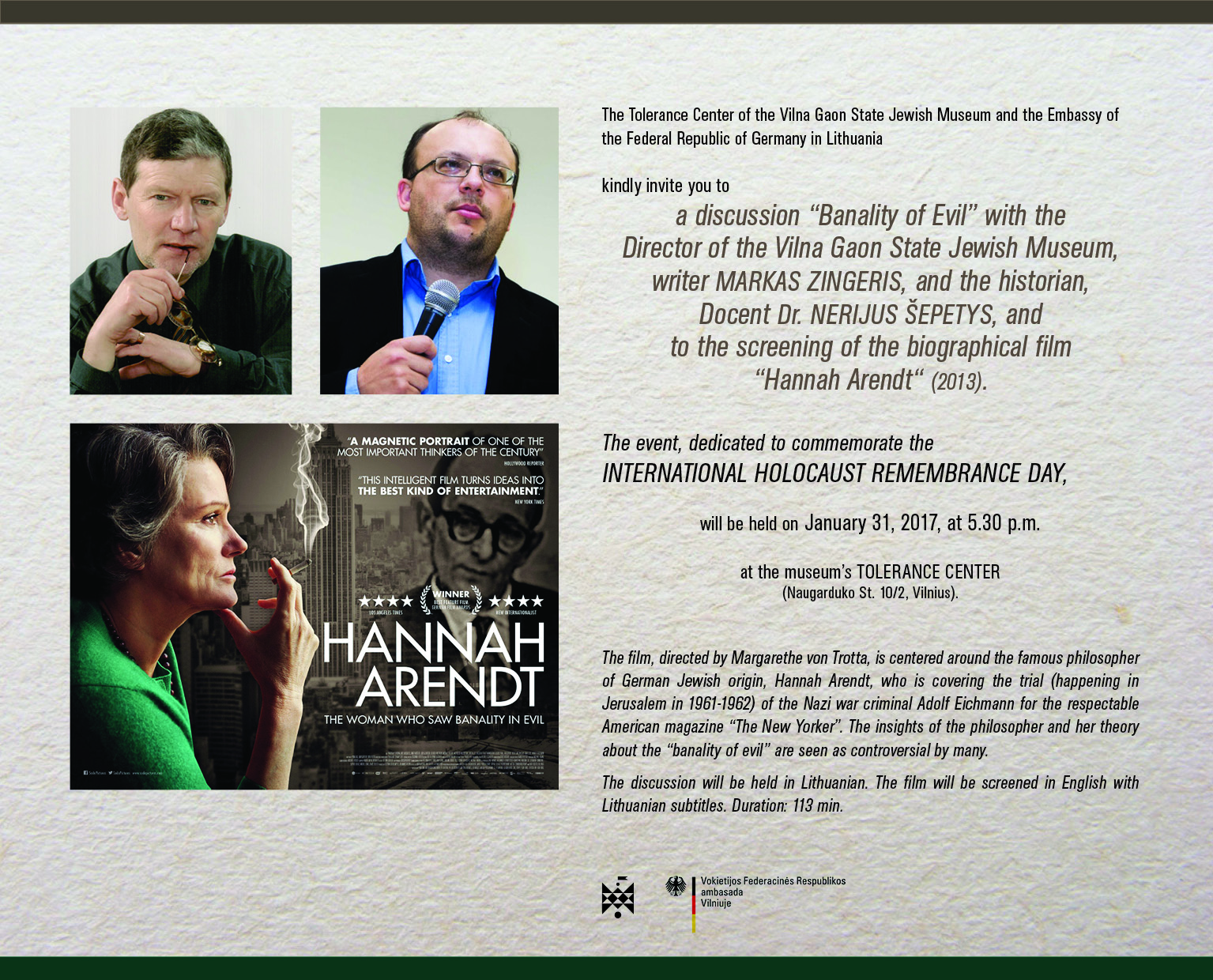
Lithuanians Rediscover Their Own Anne Frank
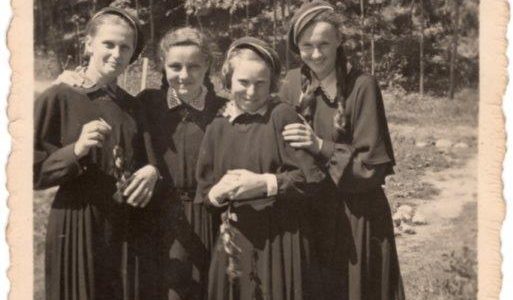
Estera Kverelytė second from left
Romualdas Beniušis writing in the newspaper Lietuvos žinios tells the story of Estera Kverelytė, a Jewish girl from Darbėnai (Drobyan or Dorbyan in Yiddish), Lithuania, who kept a diary in the months leading up to her murder at the hands of postman and policeman Vladas Jašinskas presumably in early July of 1941. Kverelytė’s diary has been lost but is known to have existed and was used in a documentary called “Nebaigtas dienoraščio puslapis” [Unfinished Page of a Diary] released by the Lithuanian Film Studio in 1964 and still available for viewing on the internet archive of Lithuanian National Radio and Television, according to the author. Beniušis is trying to locate the diary and is asking the public for help.
Full story in Lithuanian here.
Condolences
Long-time member of the Vilnius Jewish Community Galina Krivonosova passed away January 23. She was born October 4, 1937. We send our deepest condolences to her family and loved ones.
We Remember

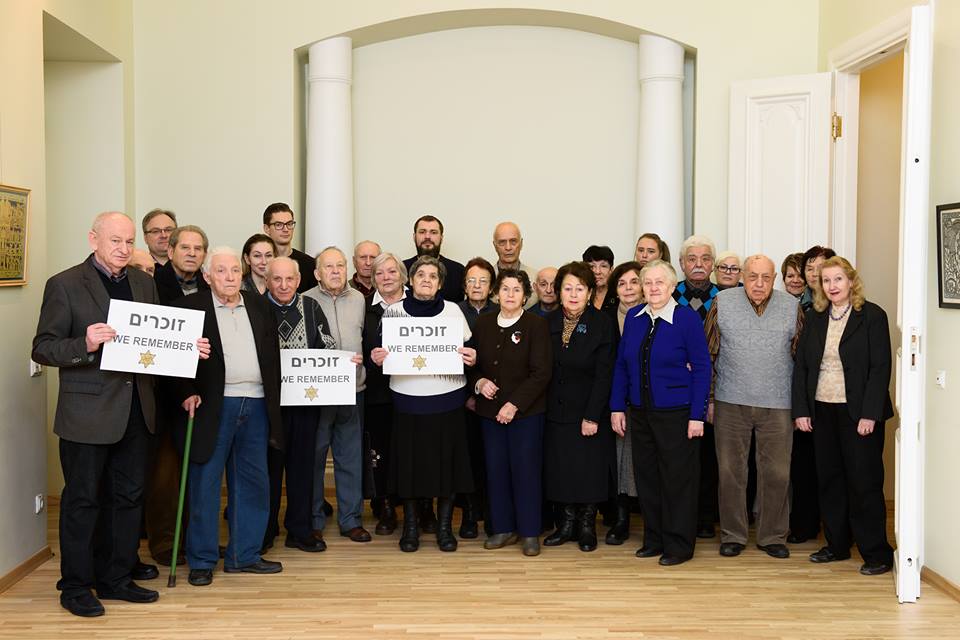
Jewish Community members including a number of Holocaust survivors
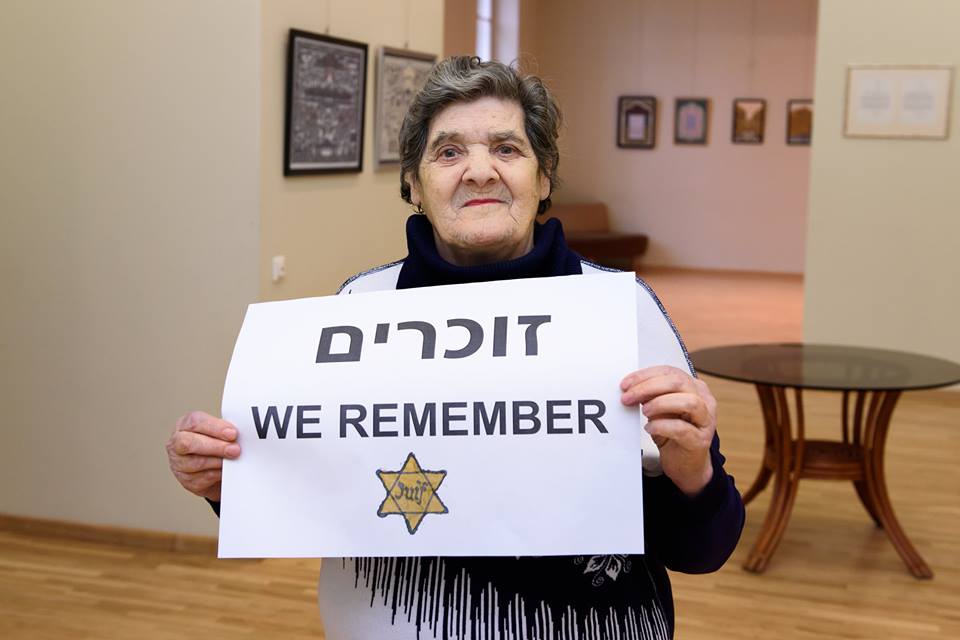
As International Holocaust Remembrance Day on January 27 draws near, the World Jewish Congress is inviting everyone to join the global campaign We Remember. Please try to make sure your Community and its leaders visit schools, churches, synagogues, youth organizations and other institutions to deliver the message. Ask your friends, students and teachers who consent to be photographed to hold homemade We Remember signs as their portraits are taken and sent directly to facebook, twitter and/or instagram, and send a link to weremember@wjc.org
Why now?
In 2017 we have to remember the Holocaust.
Because so many more of the survivors are leaving us…
Because Holocaust denial is not getting weaker,
Because genocide is still happening…
And because it is so important to educate the coming generations.
Together, we want to remind the world about all that happened.
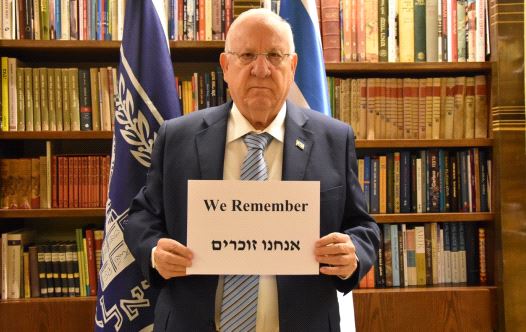 Reuven Rivlin, president of Israel
Reuven Rivlin, president of Israel
International Holocaust Remembrance Day at Choral Synagogue
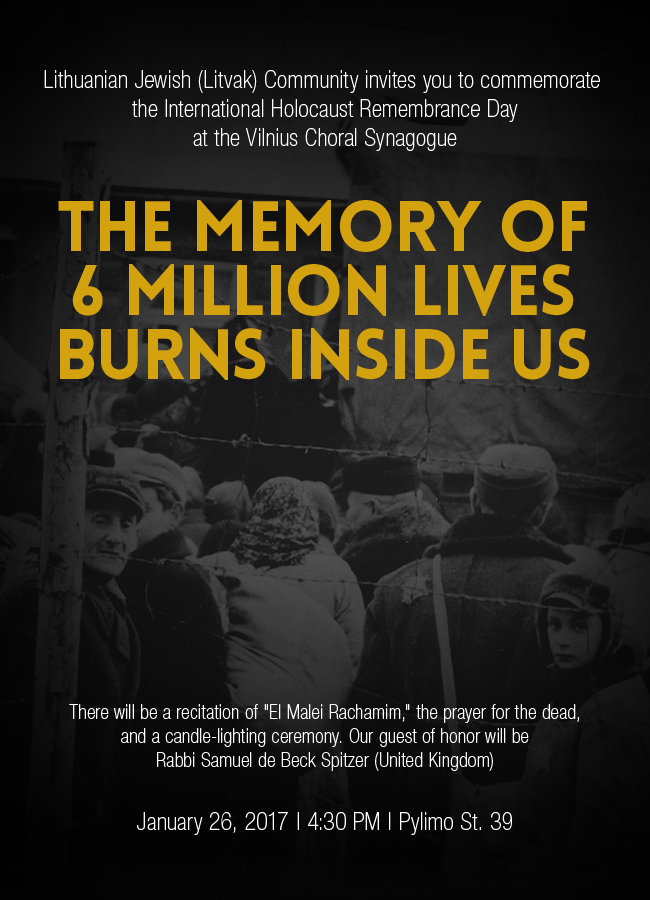
US President Asks Netanyahu to Visit to Discuss Urgent Issues in February
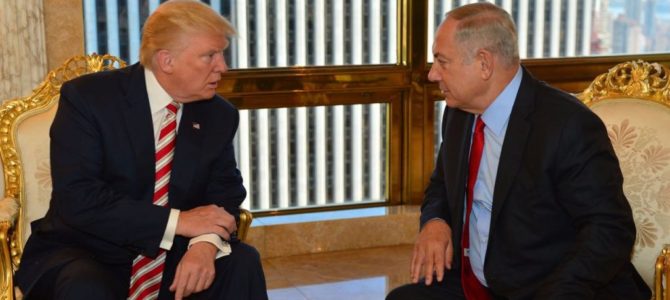
US president Donald Trump invited Israeli prime minister Binyamin Netanyahu to the US capital next month in a telephone call Sunday. The exact date for the meeting will be worked out in the next few days. Just hours between the telephone call between the two leaders, which was characterized as “very warm” in a press release following, Israel issued permits for construction of several hundred new homes in East Jerusalem. Netanyahu’s office issued a statement following the phone call saying both leaders agreed on a treaty with Iran over nuclear power development, on the peace process in Israel and other issues. The PM expressed the desire to work closely with the president to develop a vision for regional peace and security. There was no immediate discussion of moving the US embassy from Tel Aviv to Jerusalem. The acting White House press secretary told AFP talks on that, which would recognize Israel’s claims to Jerusalem as its capital, were still in the early stages. President Trump has had or will have meetings with the leaders of Great Britain and Canada in the coming weeks.
Accusations against Israeli Prime Minister Binyamin Netanyahu Explained
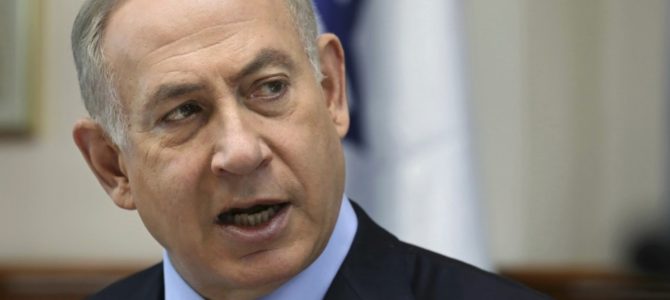

Many Israelis believe any accusations made against Binyamin Netanyahu are a political attempt to compromise him, his party and the ruling coalition, others believe he is corrupt in any event and the actual charges aren’t important. That’s what left-leaning anti-Netanyahu newspaper Ha’aretz journalist Anshel Pfeffer conveyed in an interview with Lithuanian National Radio.
Asked what exactly is going on with two separate accusations against Netanyahu–one alleging he accepted bribes and the other that he attempted to influence newspapers–Pfeffer said an on-going investigation has only recently come to the public’s attention. He said police have been investigating the prime minister for months on allegations concerning his financial affairs and agreements. Pfeffer said the prime minister is a suspect in both cases.
Kaunas Jewish Community Member Delights Modern Dance Enthusiasts
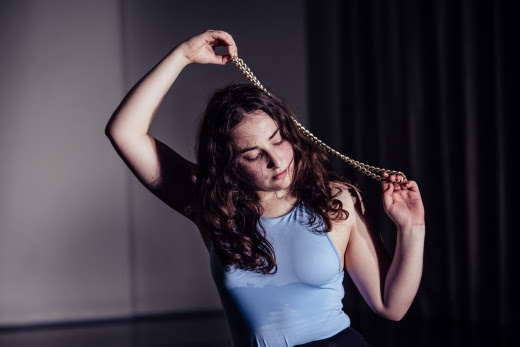
Kaunas Jewish Community member Liza Baliansnaja is presented her conceptual dance performance Residual at the AURA+ performance space on January 18. She was a member of the Kaunas dance troupe Aura from 2009 to 2011, then moved to the Netherlands and last year was graduated from the prestigious PARTS school of theatrical art and choreography in Belgium last year.
Her solo work could be called a sketch, she said. But that doesn’t mean Residual is incomplete, she cautions. In a way the piece reflects the dancer’s desire to shake off stress from striving for a perfect dance performance. She said she sought to reactivate the connection between the viewer and the actions on stage, creating a space for new ideas. Based on the connection of the libretto of the ballet the Sylph (Sílfide, Sylphide, “air elemental” in alchemy) with exophilosophy, Baliansnaja presents a diversity of expression exploring this relationship from different perspectives. How are we understood from the perspective of non-human life-forms? What is characteristically human as viewed from the outside, in the eyes of other beings?
Things Tell Stories: National Conference by Schools for Holocaust Day

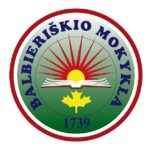
Balbieriškis Primary School, Klevų street no. 10, Balbieriškis, Lithuania
January 27, 2017
Conference program:
10:00-11:00
arrival, registration
11:00-12:00
opening, principal Stasys Valančius and International Commission executive director Ronaldas Račinskas
Radio Documentary: Lost Traces of Vilkaviškis
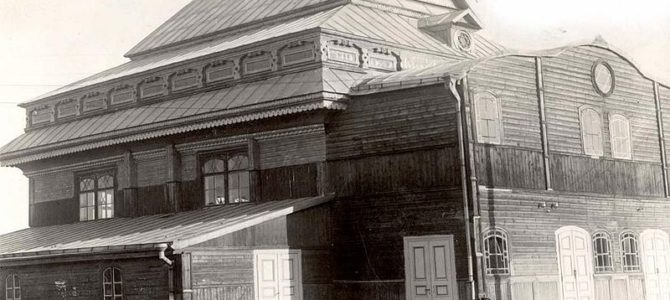
Vilkaviškis synagogue

The Lithuanian National Radio program Radijo Dokumentika aired the episode on at 11:05 A.M. on January 22. It is to be rebroadcast at 9:00 A.M. on January 24 just after the morning news program Ryto Garsai.
Feiga Koganskienė, who lived in the town in the Suvalkija region right up till World War II, says: “Vilkaviškis is only the name Vilkaviškis, it has nothing in common with the former Vilkaviškis.” When she returned to her home town after the war, the woman did not recognize it, and found none of her Jewish family or friends.
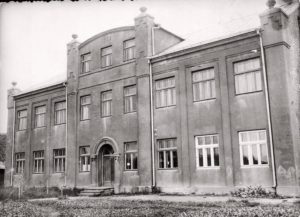
The modern Vilkaviškis Jewish Gymnasium between
the wars, now the city municipal building.
Before the war Vilkaviškis was one of the most ethnically and culturally diverse towns in the region, but now it’s perhaps the most Lithuanian town in the entire country. Today only a handful of people remember Vilkaviškis in the interwar period, and even fewer are prepared to look into the town’s Jewish history. In the Lost Traces of Vilkaviškis episode, Radijo Dokumentika reporters walk with residents for whom the Vilkaviškis of that time is not just a collection of faded facts from history.
Lithuanian Jews behind the Iron Curtain: An Exhibit in Tblisi
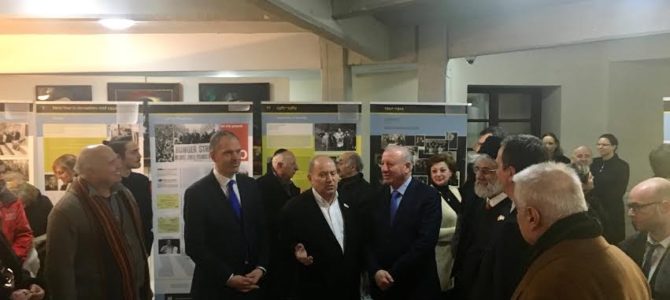
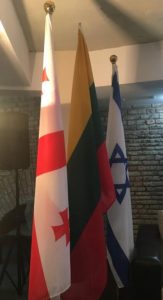
The David Baazov Museum of the History of the Jews of Georgia opened an exhibition January 18 called “Lithuanian Jews behind the Iron Curtain” about the Lithuanian Jewish community during the initial Soviet occupation of Lithuania in 1940. Members of the local Jewish community, diplomatic personnel and lovers of history were invited to attend the opening of the moving and historically informative exhibition of photographs and historical documents. Lithuanian ambassador to Georgia Giedrius Puodžiūnas and Tblisi Jewish Community chairman Jamlet Khukhashvili opened the exhibit and the Georgian minister of culture, the minister of reconciliation and civil equality and the Israeli ambassador spoke. The main focus of the exhibit was on individual efforts to resist restrictions on freedom, identity and historical memory. The exhibit is based on primary sources and items from the Vilna Gaon State Jewish Museum, documents from the Lithuanian Central Archives, the Lithuanian Special Archives and personal collections. The exhibit was prepared by the Vilna Gaon museum in Vilnius, Lithuania.
Lithuanian Political Illusions: The “Policy” of the Lithuanian Provisional Government and the Beginning of the Holocaust in Lithuania in 1941
The Lithuanian Jewish Community is publishing a series of articles by the historian Algimantas Kasparavičius, a senior researcher at the Lithuanian History Institute.
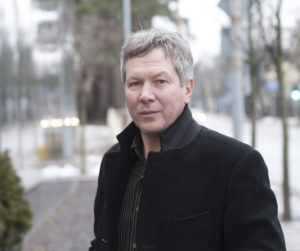
Part 3
As shown by rather abundant surviving archival sources, memoirs and historiography, the pro-German (more accurately pro-Nazi, since in principle there existed no other Germany at that time operating in the international arena as real geopolitical power) concept and strategy of liberation from Soviet occupation and annexation and restoration of the Lithuanian state [1] began to form during the first days of the Soviet occupation, i.e., the end of June, 1940, mainly at the initiative of Lithuanian diplomat in Berlin colonel Kazys Škirpa, who, for several years, had maintained good and even friendly relations with high Nazi Party figures [2]. The process accelerated immediately upon the annexation of Lithuania. As Stalinist repression growing into state terror and radical socio-political reforms took hold in Lithuania [sic]. An organized anti-Soviet resistance quickly began to coalesce by early October of 1940 in Kaunas. The main author of this strategy and its main ideologue, however, was none other than Lithuania’s long-time military attaché in Berlin, colonel Kazys Škirpa. [3] It was at his initiative and due to his efforts that the Lithuanian Activist Front was established in Berlin on November 17, 1940. The LAF established headquarters in Lithuania in Kaunas and Vilnius. Besides Škirpa, the main LAF figures in Berlin and Lithuania were E. Galvanauskas, Klemensas Brunius, Antanas Maceina and Karolis Žalkauskas, Leonas Prapuolenis, Vytautas Bulvičius, Juozas Kilius, Adolfas Damušis, Jonas Pajaujis, K. Antanavičius, J. Vėbra and others. [4]
In cooperation and consultation with German/Nazi political, military and diplomatic figures–field marshals Wilhelm Keitel and Walter von Brauchitsh, chief of the Abwehr admiral Wilhelm Canaris and Abwehr agent in charge of contact with Baltic anti-Soviet resistance organizations lieutenant colonel Herman Gräbe–a program began to be drafted for liberation from Soviet occupation and annexation. Methods, tactics and political strategy for Lithuanian partisan warfare and insurgency against the Soviets were developed. [5]
Holocaust Remembrance Day with Dr. Antony Polonsky
You’re invited to a public meeting and discussion with Dr. Antony Polonsky (the Albert Abramson professor of Holocaust Studies at Brandeis and the chief historian of the Museum of the History of Polish Jews in Warsaw) called The History of the Jews in Lithuania, Poland and Russia at 6:00 P.M. on Thursday, January 26, in the Jascha Heifetz Hall on the third floor of the Lithuanian Jewish Community (Pylimo street no. 4, Vilnius).
Moderator: professor Šarūnas Liekis.
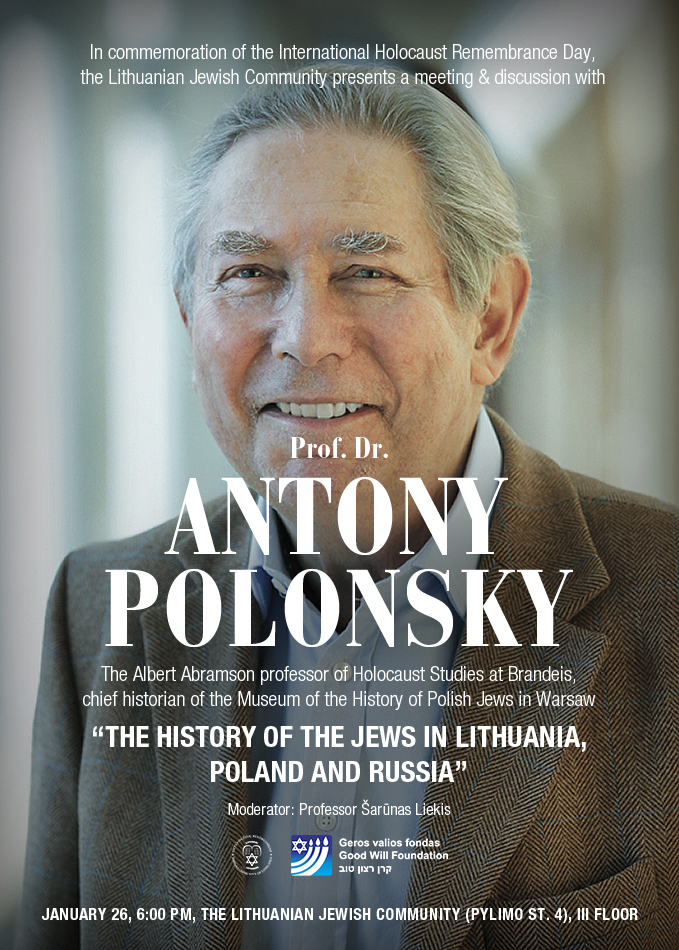
Condolences
In profound sorrow we report the loss of Vilnius Jewish Community member Vladimir Doskal, who passed away on January 17. He was born November 12, 1985.
Vladimir worked at the Community for a time and was a long-time volunteer in the LJC Social Department. We will always remember him as a very sincere, warm and caring person whose smile and laughter infected everyone in his proximity.
Our sincere condolences to his loving wife and his mother on the loss of husband and only son.
A wake for the departed began at 1:00 P.M. on January 19 at the St. Jurgis Matulaitis Church. The funeral is to be held at 12 noon on January 21 at the Karveliškės cemetery in the village of Karveliškės in the aldermanship of Zujūnai in the Vilnius region.
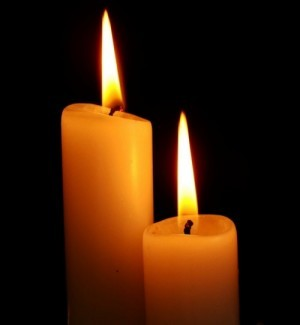
Statement in the December 2016 Newsletter of the Committee for the Preservation of Jewish Cemeteries in Europe
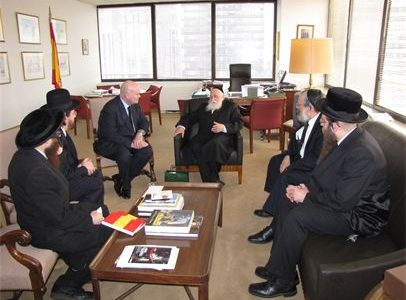
We feel it is important in this context to emphasize the major transformation that we have recently experienced in our work after so many years of campaigning and taking action to protect Jewish graves in Europe. This fundamental change is reflected in our experiences in Lithuania over the past month (as described at length in this issue). It is impossible to describe within the limits of this publication the range of difficulties, obstructions, obstinacy and deception which was faced by our representatives in earlier years when attempting to protect Jewish graves in Lithuania. Not only was there no sympathy and understanding for our efforts to save Jewish cemeteries and graves, but our representations were often faced with ridicule. Even after being convinced of our genuine concern for these matters, our appeals were not taken seriously and all kinds of ploys and untruths were used to avoid taking meaningful action. But fortunately, times have changed. Not only does the current Lithuanian Government central leadership treat the CPJCE and its requests with seriousness and respect, but even the government departments dealing with economy, transport, interior affairs etc, all show deep consideration for Jewish cemetery protection. During the past month, the CPJCE office received an appeal for assistance from the Lithuanian authorities regarding a proposed widening of a railway track, which may possibly have encroached on the area of a Jewish mass-grave. They assured the CPJCE that they did not want to disturb the burial site and requested the CPJCE to come and establish the exact location of the grave in order to ensure that it is not affected in any way.
A Mekhaye Winter Children’s Camp 2016
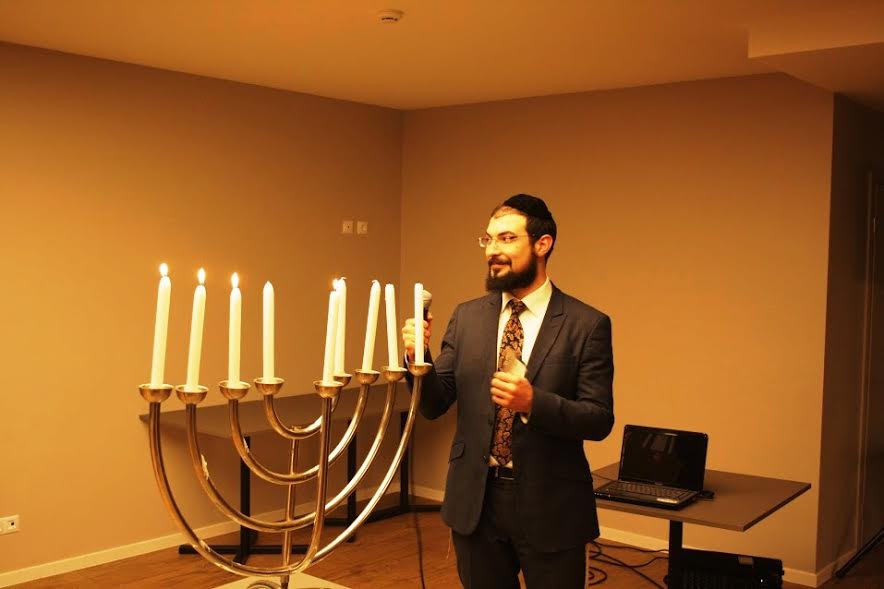
The Lithuanian Jewish Community and the Joint Distribution Committee traditionally hold the A Mekhaye winter camp for Children and did so late last year in 2016 as well. The camp is held in Dubingiai, Lithuania. It usually includes about 90 children who spend the holiday period together. This year as in earlier years we assembled a great team, people who know their work and who have been part of camp staff for several years now.
This year the theme was “Hanukkah in the shtetl,” since the camp coincided with the holiday. Each day camp counselors introduced a new topic and taught the children about it. Besides just being fun, the camp is very educational, even if information comes through games, as it often does. The children and staff say they feel right at home in Dubingiai now, as if it were their second home.
Lithuanian National Radio and Television Hosts Exhibit on Righteous Gentiles
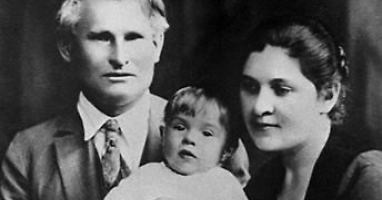
An exhibit of photographs of upstanding and courageous Lithuanian Righteous Gentiles who rescued Jews from the Nazis, performing the highest service to their nation, will open at the Lithuanian National Radio and Television Gallery at Konarskio street no. 49 in Vilnius at 3:00 P.M. on Thursday, January 19. The Yad Vashem Holocaust memorial authority and museum in Israel bestows the title Righteous among the Nations, or Righteous Gentile, on citizens of other countries who rescued Holocaust victims. This exhibition was shown earlier at the Lithuanian parliament. As readers will recall, the Lithuanian Jewish Community’s annual calendar features Lithuanian Righteous Gentiles this year as well, with a photograph of Lithuanian president Kazys Grinius and wife Kristina on the cover.
Writer Icchokas Meras, the winner of the Lithuanian National Prize for Art and Culture who was saved from the Holocaust by Lithuanians, wrote about the rescuers: “They were the blooms of the morality of the nation, the spiritual giants of the nation, no matter whether they were educated or simple people, whether they were illiterate, clergy who carried with them the true love of one’s neighbor or simple peasants broadcasting seed to the ground by hand. They, intentionally or unintentionally, opposed the destroying power of the Nazis and its tool: those who murdered. We should remember and honor their heroism based on conscience, goodness, love of one’s neighbor and simply human pity.”
Panevėžys Jewish Community to Mark International Holocaust Remembrance Day

January 27 marks the day in 1945 when the victims of the Auschwitz death camp were liberated. Auschwitz was the largest concentration camp set up by Nazi Germany where about 1.5 million people were murdered, including children, and approximately 1 million of the victims were Jews, according to the best estimates.
The Panevėžys Jewish Community will observe International Holocaust Remembrance Day on January 26 at the “Sad Jewish Mother” statue on Memory Square at Vasario 16 street next to the Vyturis Pre-Gymnasium.
Program:
2:00 P.M. Assembly, wreath-laying ceremony, speeches;
2:45 P.M. Wreath-laying ceremony at the statue “Ghetto Gate” (at the intersection of Klaipėdos and Krekenavos streets);
3:00 P.M. Forum dedicated to International Holocaust Remembrance Day at the Panevėžys Jewish Community (Ramygalos street no. 18). Documentary film about the Holocaust.
Let’s remember the heroic rescuers.
Event supporters:
